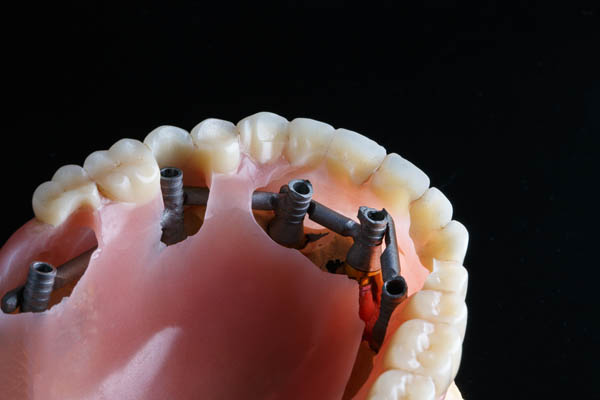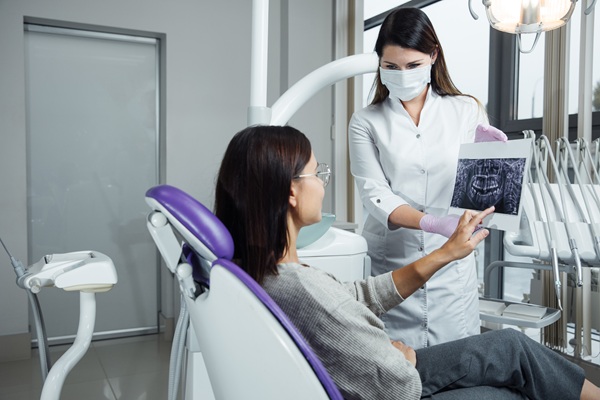How Long Does the Procedure for Implant Supported Dentures Take?

Implant supported dentures are a popular tooth replacement treatment option that combines dental implants and dentures. Because they combine two already existing treatments, individuals tend to experience extremely positive results, meaning little to no failure and full functionality of the oral cavity.
When considering implant-supported dentures, a popular question that arises is how long the procedure takes. Continue reading to find out! This information may be helpful to someone considering different tooth replacement options.
Implant-supported dentures: the timeline
Below is an overview of how long an implant-supported dentures procedure takes. It is also good to know that there are a few steps involved in the entire process.
The placement procedure
Getting implant-supported dentures does require a few steps, with the first being the placement of the dental implants. Dental implant placement requires a minimally-invasive procedure. On average, the patient should expect this procedure to take anywhere from 90 minutes to two hours, depending on the number of implants placed and how viable the jawbone is.
In some instances, the placement procedure may not be the first step. Some individuals may not have enough viable jawbone, meaning there is not enough density for implants to live. In this case, an additional step would be required to allow for a bone graft to take place. This procedure may take a couple of hours as there are two steps, with the first being removal of bone from somewhere else in the body, and the second being the actual placement in the jaw. After the bone graft, there will be a few weeks of healing. Once enough bone is added to the jaw, the dental implants can be successfully placed.
Afterward
After the dental implants are placed, there is a period of healing required. Unlike other procedures, dental implants do take up to a few months to properly heal. This is because the bone has to accept the implant and allow for fusing to take place. Fusing is referred to as osseointegration and it is a crucial step in the implant-supported dentures process.
In the particular case of implant-supported dentures, osseointegration may take up to three to four months. The length of time depends on the patient's ability to heal, as well as the number of implants placed, which in this case, would most likely be four to six.
Once the dental implants have fully fused, the patient will return to the dentist to be fitted for the dentures, which can take a couple of weeks to get back from the dental lab. Finally, the dentures will be attached to the dental implants via abutments, which are small metal connectors.
Find out more
When considering tooth replacement with implant-supported dentures, it is highly advised to consult with a dentist. Not everyone is a good candidate for the procedure, which is why a full evaluation will be necessary. During the evaluation, the dentist can answer questions and address concerns about the procedure or the process. To find out more or to get scheduled for a consultation, reach out today.
Request an appointment here: https://clarisseatakhaniandds.com or call Clarisse Atakhanian DDS Inc. at (818) 483-9071 for an appointment in our Glendale office.
Check out what others are saying about our dental services on Yelp: Implant Supported Dentures in Glendale, CA.
Recent Posts
Wondering if implant supported dentures are the right for you? In order to make the right choice, it is necessary to understand everything there is to know about all types of dentures.Considering implant supported dentures but want to understand more about the details? This denture choice requires one to undergo a dental implant placement surgical…
If you are in need of dental implants in Glendale, you may be wondering if All-on-Four implants are the right type for you. While All-on-Four implants are easier, more convenient, and arguably stronger than traditional single dental implants, there are a few assessments that will need to be taken before determining whether or not your…
You have probably heard about dental implants and how this tooth-replacement option can restore your smile. Dentures are another treatment that patients with multiple missing teeth can benefit from. Your dentist can also combine the two by providing implant-supported dentures. There are reasons that this method offers advantages over traditional dentures.Both types of dentures come…
Let's cut to the root of the matter: wearing loose dentures is uncomfortable, dangerous, and often a source of embarrassment for their wearers - mainly when speaking or enjoying a meal. Many patients don't realize the potential long-term impact of wearing loose dentures or that they don't have to spend months or years dealing with ill-fitting…


